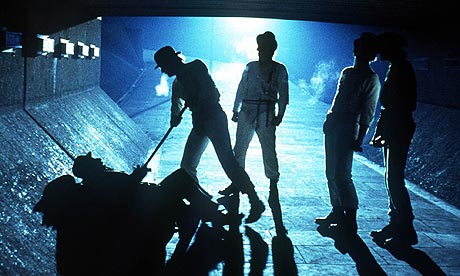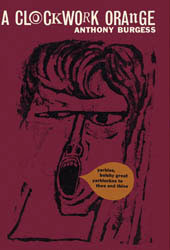Okay, all of you read A Clockwork Orange (or at least watched Stanley Kubrick’s adaptation), so I won’t be boring you with a review here. If you haven’t done any of the above, out out out out out, you dobby chellovecks. Go read the book then return. This here is the story behind the writing of Anthony Burgess’s classic novel — which is in itself the stuff stories are made of.
An ex-British Army officer by the end of World War II and a teacher of English Literature, Burgess joined the British Colonial Service as a teacher and education officer in Malaya in 1954. (This experience would lead him to become a writer, first, as he said, “as a sort of gentlemanly hobby, because I knew there wasn’t any money in it,” and to publish his first novels, Time for a Tiger, The Enemy in the Blanket and Beds in the East.)
However, Burgess was sent back to England and released from the Colonial Office in 1959, after being diagnosed with an inoperable brain tumor. The doctors told him he didn’t have much more than a year to live.
Instead of worrying about himself, however, Burgess became terribly troubled by the thought of leaving his wife without an income. So, he planned to write a reasonable amount of novels so she could live comfortably on the rights.
They moved to a small apartment in the town of Hove, near Brighton, on the southern coast of England, and Burgess started writing immediately. His original plan consisted in writing no less than ten novels in twelve months. He didn’t make it—but, even so, his efforts paid off handsomely: in a year, he had written five novels by his own name and two by the pen name of Joseph Kell. The Anthony Burgess novels were Doctor Is Sick, The Wanting Seed, Honey for the Bears, Nothing Like the Sun, and A Clockwork Orange.
In fact, A Clockwork Orange was really a draft by that time. The reason we can read it today is that the doctors were wrong: it turned out he didn’t have anything at all. So he could give the manuscript a careful rewriting and finally publish it in 1962.
The reason why the first draft of A Clockwork Orange wasn’t finished during Burgess’s spree at Hove wasn’t lack of time, but a great concern for the use of language. Always fascinated by slang, dialects, neologisms, and the jargon of subcultures (what today we call urban tribes) he set up the outline for the book already with the theme and the near-future panorama we know. Upon arriving from Malaysia after five years abroad, Burgess had a big culture shock when faced with some new things that was blooming all over England: cafeterias, pop music—and teen gangs.
One thing that impressed him particularly was the savage, war-like rivalry between Mods and Rockers, two working-class urban tribes with different fashion and music styles but the same teen angst. Their attitude and their slang attracted Burgess, who started writing A Clockwork Orange using them as a working model. But, as Blake Morrison points out in the preface to the 1996 Penguin Classics edition, Burgess worried about the ephemerality of those jargons: he thought all that could be outmoded by the time the book was published.
It was only in 1961 (after the brain-scare had passed) that the solution to this linguistic quandary was found: Burgess and his wife Llewela spent a few days in Leningrad. Two things then influenced the rewriting of A Clockwork Orange. First: to better prepare himself for the trip, Burgess began studying Russian language again (he had learned it as a young man).
It was then that it occurred to him that the vocabulary of his “space-age could be a mix of Russian and popular English, spiced with rhyming slang and gypsy talk”. (I quote from memory.) Second: the totalitarian regime of USSR was also having problems with its own teen gangs (which had nothing to do with the political dissidents the soviet government was used to fought until then). The nadsat slang was created — and, with it, the version of A Clockwork Orange as we know it.

The science fiction in this novel is maybe more in the way it’s told than in the future it describes. An example? (Spoiler/violence alert: the excerpt below is a beating/gang rape scene—you may want to jump it.)
So he did the strong-man on the devotchka, who was still creech creech creeching away in very horrorshow four-in-a-bar, locking her rookers from the back, while I ripped away at this and that and the other, the others going haw haw haw still, and real good horrorshow groodies they were that then exhibited their pink glazzies, O my brothers, while I untrussed and got ready for the plunge. Plunging, I could slooshy cries of agony and this writer bleeding veck that Georgie and Pete held on to nearly got loose howling bezoomny with the filthiest of slovos that I already knew and others he was making up … Then there was like quiet and we were full of like hate … “Out out out out,” I howled. The writer veck and his zheena were not really there, bloody and torn and making noises. But they’d live.
Maybe the nadsat is the necessary element (the novum, I wonder?) to establish the cognitive estrangement that makes A Clockwork Orange a story so weird and yet so fresh, so terribly in sync with current events all over the world. Because this dystopian future Burgess is telling is very close to our reality.
Fabio Fernandes read A Clockwork Orange in the middle of a teen angst crisis and it changed his life forever: now he’s a weird writer—or writer of weird, which maybe is the same. (Oh, and a few years ago he translated A Clockwork Orange to Brazilian Portuguese. It was hard, but it felt damn good.)










